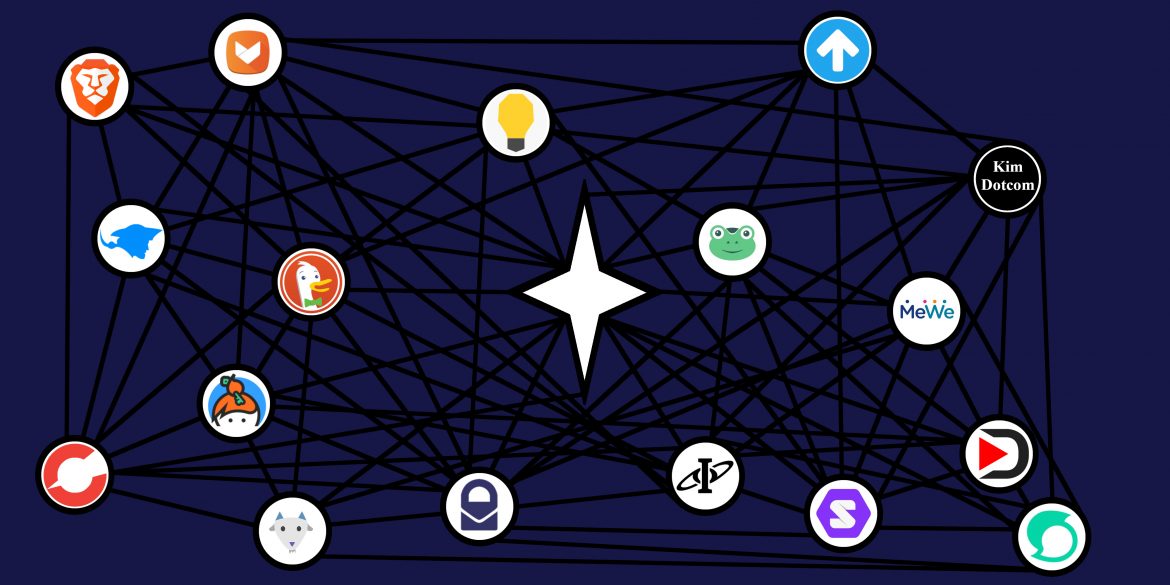This is Part 2 of a three article series on the social media upheaval. You may read Part 1 here.
In the previous post, a challenge was initiated. Social media users were challenged to remove their business to other media platforms, to reign in the monopolies of social media. Though many people have wished to do so, there is always the overriding questions: Where do they go? Which platform best suits their needs? With how fast-paced life has become in the 21st Century, many do not have the time to do the in-depth research into that sector of the internet known as “The Alternative Social Media”
Herein lie a listing and summary of many social media platforms which make up the fast-growing field of the Alternative Social Media. Unlike some of the alternative options touted by the establishment media, these options put teeth into their beliefs. They respect user privacy and honestly act as either neutral-based platforms or explicitly state their purpose of benefiting a certain ideology. This honesty is a sound foundation which should instill trust in any potential users.
The Alternative Social Media Options
DuckDuckGo – Duckduckgo is a search engine which puts emphasis on protecting the privacy of the users who search through it. Founded in 2008, the search engine’s popularity exploded in June of 2013 after Edward Snowden blew the whistle on the NSA’s spying scandal and its connections to Google. Since then it has become the default search engine for many interested in keeping their search history private. The search engine’s policy of not profiling their users does lead to a non-tailored searching experience. This can make locating certain website pieces a more cumbersome experience than on Google in its pre-censorship days. For those concerned with their privacy, that short-term sacrifice is well worth the long-term benefit. Recently Duckduckgo also expanded into the browser market by creating a mobile phone browser app. This app eradicates a browser’s search history at the user’s request when they finish their search. A valuable tool in fighting back against online surveillance.
Brave – Though not strictly speaking social media, the Brave internet browser should be considered part of the alternative social media network for its ad and tracker-blocking features which are unique in the realm of internet browsers. This is a welcome relief from the undercover tracking and monitoring carried out by the default browser Google Chrome. In light of the breaches to Google’s data as well as Google’s own abuses of power through monitoring its users, Chrome is no longer a viable option for the privacy-conscious. Brave provides them a valuable alternative with its user-controlled and user-dictated blocking measures. Developed largely by one of the founders of Mozilla, Brendan Eich, it has obtained a stellar reputation already. Its relationship with the Tor Project, a long-standing privacy-protection browsing program, enhances its connection to protecting internet privacy. All these factors make Brave a wise investment for those who believe in internet freedom and privacy rights.
Protonmail – This email service, a fast-growing replacement for Gmail and Outlook, has a huge advantage in its favor. It relies on encryption, an online security mechanism endorsed by one of the most tech-savvy individuals in the world: NSA whistleblower Edward Snowden. Its servers are Switzerland based, a country with diplomatic barriers to honoring U.S. and E.U. search warrants, making it one of the safest email servers in the world today. Still young, since it opened to the public in March 2016, this email service has already attracted the oceans of business. This is especially true of journalists, in particular, those engaging in undercover and dangerous assignments such as James O’Keefe’s Project Veritas. That also should speak volumes about the effectiveness of their encrypted email service. Due to its lack of revenue from advertising, there are certain features about the service which need payment to use. But when taking into account that no one but you and the recipient of your email can see what you send, it becomes clear that the small cost is well worth it.
Inrupt/Solid – This is one of the most inventive ideas to grace the world of social media in the last twenty years. Who better to introduce it, then, than the internet’s founding father himself: Sir Tim Berners-Lee. In an exclusive interview which went viral online thanks to the Drudge Report, Berners-Lee describes Inrupt and Solid as creating ‘pods’. These pods are like a USB drive on the internet, designed to let users assemble their data and control it themselves so that corporations and governments will not have access. It will be one of the best internet-privacy-enhancing products in a very long time once it is developed enough to go mainstream and be used by the general public; a result Berners-Lee hopes comes to fruition very soon.
Minds – Of all the alternatives based on the Facebook model, Minds is the most unique. Using elements from not only Facebook but also Twitter and Instagram, it is more than a social media network. It is tailored to people who wish to get their message, brand, website, and other creations out to other like-minded creators and followers. In an interview conducted about the platform, Minds co-founder and CEO Bill Ottman described his site as standardizing a practice often carried out between fellow online content creators. This practice is when two or more creators exchange social-media-sharing favors for other social-media-sharing favors or money. While Facebook, Twitter, and the other social media monopoly members frown upon this practice, it is actually built into the infrastructure of Minds and encouraged as an entrepreneurial practice carried out in the business world. The site is cryptocurrency-based to help enhance the earnings potential of the creators advertising their work without relying on the fickle political-leanings of payment processors like Stripe. Its news feed is also chronology-based rather than manipulated in an algorithm-based structure like in Facebook, which enhances the reach of creators on the network as well. The site also hosts a video service, a blogging service with a paywall and a group service to give their users even more ability to share their work. While Minds can be used by anyone with relative ease, its features are tailored to appeal more to content creators who can be rewarded more easily on a network that can become their marketplace.
You can follow this website’s posts on Minds at On This Terrestrial Ball.
You can follow the Instructive Scholar on Minds at The Instructive Scholar.
Gab – Meet the alternative and major competitor to Twitter. That is the best way to describe Gab. Founded in 2016 in response to Twitter engaging in censorship of the users with whom the Twitter leadership disagreed, Gab has also grown quickly since it opened to the public. The services it offers are similar to what one would find on Twitter, but with a few added features. These include a paid GabPro option for users who want to post longer “gabs” (the site’s version of ‘tweets’), live stream on GabTV (the site’s video-hosting service), verify their profile quicker and many other quirks. The site has received criticism and severe attacks from the liberal and establishment press for its allowance of controversial and extremist-type figures to use its platform. These attacks resulted in a temporary shutdown of the site in late October and early November of 2018 thanks to the establishment and leftist protests. The reality though, is that the site is open to everyone regardless of ideology. Moreover, the site has made it clear that it will remove any illegal actions committed through the site, but that the site will not censor individuals for expressing opinions or beliefs. It leaves blocking views which users find offensive or hurtful to the users themselves. A blocking feature ensures that particular user will no longer see posts by the individual they do not agree with or find offensive. The free speech-oriented nature of the site is what has made it so popular to date. The easy learning curve for the quirks of the site also makes the social media experience on this site a pleasant one and not an encounter with a digital Sword of Damocles.
You can follow this website’s posts on Gab at On This Terrestrial Ball.
You can also follow the Instructive Scholar on Gab at The Instructive Scholar.
MeWe – MeWe brands itself a “next generation social media”. They place their emphasis on the fact that they are #not4sale and so do not sell or collect any aspect of their users’ information. On an in-depth exploration of the site, one will find that it is a curious hybrid of Facebook and Twitter with decency, privacy and respect for social media users as its emphasis. Launched in 2016 it is, like the others, a new site, and it has been growing on the heels of the #DeleteFacebook movement. This makes it the fast-growing main alternative to Facebook for those who use social media to stay connected with friends and family. The site is still working out some bugs, but for those familiar with the Facebook layout, they should find the transition from Facebook to MeWe to be relatively easy. On an added note, Sir Tim Berners-Lee, the internet’s founding father and inventor of the Inrupt/Solid program, is one of MeWe’s advisers. As such, plans are in the works for MeWe to be the first social media site to form a connection to Berners-Lee’s Inrupt/Solid invention.
You can follow this website’s posts on MeWe at On This Terrestrial Ball
You can follow The Instructive Scholar on MeWe at Instructive Scholar.
Oneway – One of the newest of the social media platforms which have sprung up in response to the social media monopoly’s scandals. Oneway is probably one of the broadest as well with all the options they give to their users. Founded in January 2018, the site advertises itself as “The free speech and human-friendly alternative to Google, Facebook, Twitter, Youtube, Reddit, Imgur, and Patreon.” Oneway lives up to its promise, incorporating several elements from all those social media sites. The site gives its users the ability to blog, post videos, share stories, take part in forum-type groups and share articles or observations on their profile pages. In a recent interview, Oneway’s founder and CEO Derek Peterson described his disgust and dismay at Facebook’s manipulative algorithms and experiments. He went on to say how Oneway was founded to counteract that method of social media. Oneway does not rely on algorithms but allows individuals the freedom to express themselves and their views with others. Like many of the other new platforms, users can block or mute fellow users with whom they do not agree from interacting with them. Those blocking mechanisms in no way affect the blocked users’ use of the entire site. Though still working through some bugs and making improvements, Oneway is a fascinating social media platform and its ambidextrous ability should give it a unique niche in the Social Media world for years to come.
You can follow this website’s posts on Oneway at On This Terrestrial Ball.
You can follow The Instructive Scholar on Oneway at Instructive Scholar.
BitChute – Video-hosting sites are one of the more difficult Social Media platforms to create due to the complexity and space-taxing requirements it can place on a platform. In spite of these difficulties, “BitChute” has already created a platform for a reliable video hosting service alternative. The site is similar to Youtube in design, though it adds a few analytics features in the video-playing bar. Those finding themselves demonetized or censored by Youtube for providing alternative views to the establishment can find a familiar home in BitChute. The biggest argument against BitChute is that embedding videos from the site is a little more complicated than one would find on Youtube or other alternative sites such as Dtube. It is doable, thanks to a tutorial the site itself provides, but to be successful in embedding the videos requires some basic HTML and coding knowledge to understand the process. Once that hurdle is overcome, BitChute becomes a valuable tool in fighting back against Youtube censorship and getting video and audio messages out to the general public.
You can follow this website’s videos/podcasts on BitChute at On This Terrestrial Ball.
Voat – The main competitor to the social news aggregation and discussion site Reddit. Similar in layout and setup, the main difference from Reddit is that Voat does not engage in censorship except where it concerns explicitly illegal actions. There are restrictive measures placed to ensure that the people who post are actually regular users and not spam or scam artists. For example, individuals may not post until they have engaged in a certain amount of existing posts. Yet, the site is a good place to find news, get the word out and spread one’s own work once a user’s interaction with the site has met the site’s specifications.
Steemit/Dtube – The cryptocurrency-based social media platform “Steemit” has also begun carving out a unique niche in the growing world of the alternative social media. Described as a “decentralized Reddit“, users who are unfamiliar or inexperienced with cryptocurrencies can begin to learn how it works through posting and curating content on the site. Its blockchain design and serverless architecture make it almost impossible to censor what is placed on the site and truly opens up the publishing world to free market forces. Steemit has also created a serious challenger to Youtube with its video-hosting site known as “Dtube” where, again, the serverless, blockchain design makes it almost impossible to censor. Though both sites are relatively well-populated, Dtube has become an alluring alternative to Youtube by its service. As such, it is once again a home to those whose viewpoints may not be in-line with or popular with those of the establishment classes. Steemit has also added a few other features such as the unique feature “DMania”, a host site for sharing and upvoting memes. They have also added the ability to live-stream on “DLive” as well as their own version of microblogging known as “Zappl”. All of these are making Steemit an extensive and interesting network. The site can be a bit frustrating at times thanks to its super long passwords and other security measures; however these measures also make it one of the most secure alternative social media sites that there are.
Infogalactic – Despite the constant accusations of inaccuracy and insufficient scholarly links, Wikipedia is a reference point for many individuals who do basic introductory research online. However, the site angered many with their lurch away from impartiality and towards overtly favoring a certain viewpoint. This is in addition to pages concerning politically prominent figures being vulnerable to vandalism. Therefore a new site was launched in 2016 to provide a viable alternative and potential replacement to Wikipedia which would seek to improve factual accuracy and neutralize the vandalism. This new site, called Infogalactic: the Planetary Knowledge Core, bases the info it presents upon seven ‘canons’ or principles by which they evaluate and present the encyclopedic entries on the site. This makes the site more neutral than Wikipedia in its presentation of the facts and so a more reliable source for online research overall. As it grows, this site could prove to be a future key player in the alternative social media world and in the battle to present the truth rather than biased perspectives.
Aptoide – Tired of Google’s attempt to dictate all you do on your Android phone? Frightened of the shady tactics to keep you logged in to the Google Play store? Fear no longer. Aptoide is here: an alternative customizable app store through which android phones can download apps and install them without being beholden or bound to the Google monopoly.
Keybase – For those familiar with the business-tailored online service known as Slack, Keybase should prove to be a familiar setup. Designed with profiles for users which are a curious hybrid of ideas from Twitter and Skype, users can create encrypted chat groups for online business associates who do not live in the same general vicinity. The encryption practice is what makes the service attractive to business owners interested in the privacy of themselves and their business. With encryption, the chats are un-hackable by outsiders and so access can only be gained through the permission of the chat groups’ owner/moderator. This is a tool of the future for online business and campaigns.
Codias – For those who wish for a networking social media site designed purely for conservatives working on campaigns and projects, Codias fits that bill. It was founded in 2016 by individuals seeking to found a central site from which conservatives could network and organize with other nearby conservatives. The idea is that if the organization could happen ahead of time through the site, more could be accomplished. The site is for activists and volunteers alike and encryption technology makes it secure from outside interference. For individual users, there is a page and a newsfeed from which news is shared with fellow activists and a ranking program on certain aspects of political activism. Using this, members can give each other “reputations” based on their effectiveness in past campaigns and so in the future they can be put in roles where they are most effective. Though still in its infancy, the site has great potential to be a model for future political social networks on how to organize and come together with great effects when needed.
Kim Dotcom’s Social Media Project – In late July 2018, internet entrepreneur and online personality Kim Dotcom announced he was developing a replacement for Twitter which “could launch in a year”. So far he has been dropping hints about the status of the project, at one point even inviting fellow internet freedom and privacy-rights activists such as Julian Assange and Edward Snowden to join the project. Considering the expertise of Dotcom (as well as Assange and Snowden if either has joined the project) in website and platform building as well as internet security, this project has the potential to be a very secure social media platform if they can get it through to launching time. Those interested in keeping an eye on this development should follow Dotcom’s Twitter feed @KimDotcom where he publishes occasional cryptic updates on the project.
Others – There are many other alternative social media sites for individuals to explore. A prominent list of certain other sites was published in late March 2018 and provides some other great options tailored to what certain users would be seeking. For those wishing to break through the social media monopoly put forward by Google, Facebook and Twitter, all of these sites are worth exploring.
Alternative or Not? The Question of other Social Media Options
It is important to remember that not all social media platforms branding themselves as “Alternative Social Media” are true alternatives. For example, Instagram and LinkedIn are clearly not members of the alternative social media, though some sites advertising alternatives to Facebook like to give the impression that they are. Instagram is actually owned by the same group which owns Facebook. LinkedIn, Snapchat and other well-known social media platforms are ingratiating themselves with the social media monopoly by going along with some of their more despicable actions. This includes, but is not limited to, no-platforming people the social media monopoly disagrees with. This means finding and choosing an alternative social media platform should be done with the utmost care. If none of the platforms listed here meet the needs the individual is looking for, then every precaution should be taken in settling on an alternative media solution.
The Future
What would happen if the migration to the new freedom-oriented platforms begins to take place en masse? It would lead to a transformation in the world of social media. This means a re-sculpturing of the internet’s social scene in a way never before seen; a change in fortunes unmatched since Facebook and Twitter first toppled MySpace.
The implosion of the social media monopoly will be a far more impressive scene than MySpace’s fall from prominence. It will be an unraveling struggle which will turn ugly on the monopoly’s side before it finishes. It will be a true revolution of the social media world.
Be sure to read Part 1 and Part 3 to this article series to get the WHOLE story!
© 2018 Grant Dahl & On This Terrestrial Ball. All rights reserved. This material may not be re-published, re-broadcast, re-written or re-distributed without permission from the author of this piece.




